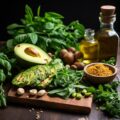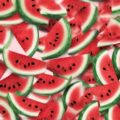Maintaining a healthy diet starts with making smart choices at the grocery store. Having a well-planned grocery list can help you stay focused on your health goals and ensure you have nutritious options available at home. Here’s a comprehensive guide to creating an essential healthy grocery list.
Fruits and Vegetables
Fruits and vegetables are the cornerstone of a healthy diet. They are rich in vitamins, minerals, and fiber, and they can help reduce the risk of chronic diseases. When shopping for fruits and vegetables, aim for a variety of colors and types to ensure you get a range of nutrients.
- Apples
- Bananas
- Oranges
- Berries (strawberries, blueberries, raspberries)
- Leafy greens (spinach, kale, arugula)
- Broccoli
- Carrots
- Bell peppers
- Sweet potatoes
- Tomatoes
Whole Grains
Whole grains are an excellent source of complex carbohydrates, fiber, and essential nutrients. They provide sustained energy and can help improve digestion. Look for minimally processed whole grains to get the most nutritional benefits.
- Oats
- Brown rice
- Quinoa
- Whole wheat bread
- Whole grain pasta
- Barley
- Farro
Lean Proteins
Protein is essential for building and repairing tissues, and it also helps keep you feeling full. Choose lean protein sources to support muscle growth and overall health without consuming excessive saturated fats.
- Chicken breast
- Turkey
- Fish (salmon, tuna, cod)
- Lean cuts of beef or pork
- Eggs
- Tofu
- Legumes (beans, lentils, chickpeas)
- Greek yogurt
Healthy Fats
Healthy fats are vital for brain health, hormone production, and the absorption of fat-soluble vitamins. Incorporate sources of unsaturated fats into your diet while limiting saturated and trans fats.
- Avocados
- Nuts (almonds, walnuts, cashews)
- Seeds (chia seeds, flaxseeds, pumpkin seeds)
- Olive oil
- Coconut oil
- Nut butters (peanut butter, almond butter)
Dairy and Dairy Alternatives
Dairy products and their alternatives provide calcium, vitamin D, and other essential nutrients. Choose low-fat or plant-based options to meet your dietary needs.
- Low-fat milk
- Almond milk
- Soy milk
- Low-fat cheese
- Cottage cheese
- Greek yogurt
FAQs
What are some healthy snack options for my grocery list?
Healthy snack options include fresh fruits, nuts, seeds, Greek yogurt, hummus with vegetables, and whole grain crackers.
How can I make sure I’m buying the freshest produce?
Look for fruits and vegetables that are in season, as they are more likely to be fresh and flavorful. Check for firmness, bright color, and lack of blemishes or bruises.
Are frozen fruits and vegetables as healthy as fresh ones?
Yes, frozen fruits and vegetables are often just as nutritious as fresh ones because they are typically frozen at their peak ripeness, preserving their nutrient content.
What should I avoid when grocery shopping for a healthy diet?
Avoid processed foods, sugary snacks, and beverages, as well as foods high in saturated and trans fats. Instead, focus on whole, minimally processed foods.
How can I save money while buying healthy groceries?
To save money, buy in bulk, choose seasonal produce, use coupons, and plan meals around sales and discounts. Additionally, consider store brands, which often offer the same quality at a lower price.









